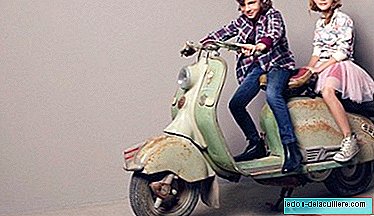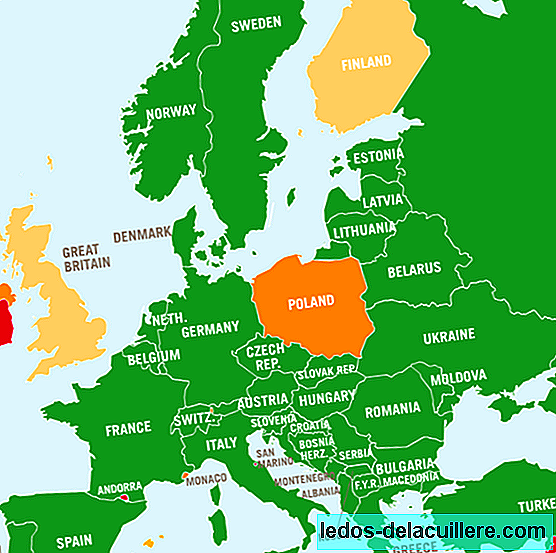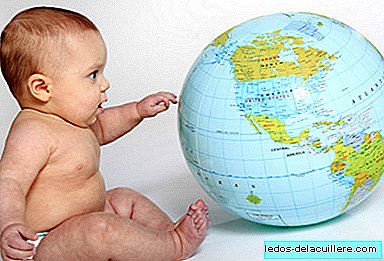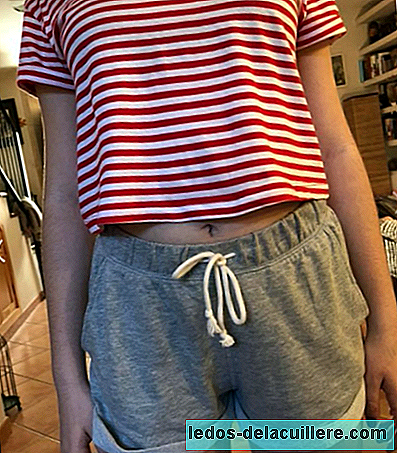With the amount of problems that women have today when breastfeeding one wonders, how is it possible that we have come here if the natural way of feeding a baby is so difficult and fails on so many occasions?
Answer: thanks to the transmission of knowledge from grandmothers to daughters, who knew what to do when there were problems because they had the experience of breastfeeding several children. Yes, there were also alternatives, because when it was impossible the baby was fed by another woman or received animal milk, but there were many more direct solutions from the grandmothers and this now does not happen so much: what a shame that most of our mothers can't help with breastfeeding problems.
Breastfeeding is an act that is learned
Babies are born knowing how to breastfeed. They have the reflex of suction, and that way, when they have their chest in front, they grab it and suck. But women are not born knowing how to breastfeed.
It doesn't really have that much secret, because it's the baby that sucks, but if there's a problem, if something goes wrong, the woman doesn't have the tools or the solutions, because breastfeeding is an act that is learned.
You learn by watching other women breastfeed, you learn with the habit of seeing what is normal, you learn by asking other women who breastfeed, or others who gave it, and in that equation the mother of one enters: "Mom, it hurts me, "" I don't think he eats enough, "" I suck for a long time, "" cracks are coming out, "" he cries too much, "" what do I do? "
And mom, always, from the beginning of time, I had an answer to those questions. And if anyone did not have it because he had not lived something similar, he knew who had them: his sister, his cousin, his friend ... there was always someone who had gone through something like that and had the solutions.
But now this does not happen, and in many cases, not only do they not know, but they recommend what they did: "well do not suffer, that you are going hungry. Give a bottle. I raised you with the bottle and look how good you are. "
The fault is not theirs
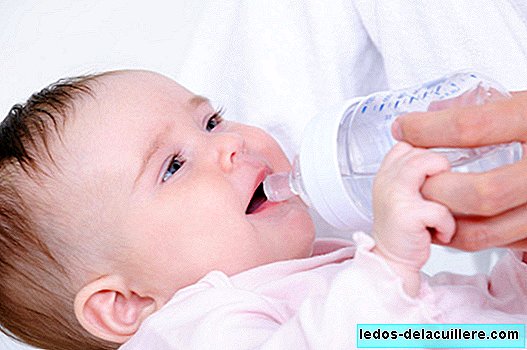
It happened like that. Agreed that they were at the time and the least opportune place, with a baby in their arms, following the advice of those who were supposed to know more. The liberation of the woman took place and the philosophy was established that said women should not continue to be slaves of their husbands, their homes, or their children, and that the work would finally make them free (and I am not against , of course, but this should be linked to a greater commitment of men so that women did not have to work and also remain in charge of the house and children equally, and this has not happened in every home).
Those that embraced this trend they exchanged breast milk for the bottle, which other people could also give. And those that took longer, or did not get to look for work, too, because the industry managed to make everyone believe that artificial milk was almost the same as breast milk. Look at Nestlé's Lactogen, the best milk for your baby:

Or how they placed advertising in a place where the message will be recorded twice: on the left the post where we see that you raise it badly if you do the images on the left and if you do the right. In the feeding section there are only two options, feed him milk with a very rare device in which the baby makes a face of "how disgusting" and to his right a bottle that makes him happier. Something similar happens in the images below.

And to the right of the post, Nestle saying that if breastfeeding is not going well for you the most similar milk with which the baby will not notice the difference (I don't want to imagine how these babies sat with milk at the time) is yours, their artificial formula.
To this we must add that health professionals began to advise practices that indirectly made breastfeeding a failure: clean the breasts before each take, put on sterile gauze afterwards, recommend that the baby suck only 10 minutes from each breast and never before 3 hours, etc., situations that led many babies to go hungry and many women to suffer engorgements and mastitis (for producing a milk that the baby did not have time to extract). These mastitis ended up in many cases in cysts that had to be opened and drained, and of course, a woman with an infected and open breast no longer breastfed any baby.
What learning did those women have left? What can they transmit today to their daughters? That the chest is the best? That breastfeeding is a wonderful thing? To breastfeed only 10 minutes per breast every 3 hours and if you cry, wait for it? For that and what they learned from their experience and that of others, but in their eagerness to see their daughter as happy as possible, to make it easy, many end, as I mentioned, recommending the bottle, because they have no more solutions to offer.
Something is changing
So it is a pity that the chain of transmission of knowledge from mothers to daughters was broken for the first time in history just when they were mothers. They stopped seeing women breastfeeding, they could no longer learn from them, and when their mothers, our grandmothers, wanted to help them, it was not possible because "now there are many advances and things have changed."
And the advances were not such, although yes, things changed making only those who could not afford to buy bottles and artificial milk, or who did not work, would breastfeed. That is, women from disadvantaged social classes. Breastfeeding was denigrated and ended up saying that it was a thing of poor and gypsy, which remained anchored in the past, nothing modern, and this is how the bottle ended up being normal.

Now this has changed. Breastfeeding is much more alive and, although the figures are still very low for what would be desirable, everyone is clear that it is normal to breastfeed.
In the same way that the first to make the change at that time were the most modern women, of higher socio-cultural level and of a higher social stratum, they have now also been the first to breastfeed, leave the bottle behind and even do it for longer. The lower socio-cultural class took longer to "convert" to the bottle but now they see it as a comfort and a valid resource. In this case, it will also take longer to breastfeed again, as they have worse access to information and many still think that the difference cannot be so much (I see this daily in the consultation, with women who immediately stop breastfeeding to bottle feed and who also feed them based on small pots or commercial pots, perhaps believing that it is healthier or better).
In the absence of mothers, who helps women?
So in the absence of mothers, who helps women? Well other mothers other than those of today's mothers. Since the doctors began to be heard for these needs, since they managed to make them believe that they were the ones who knew, and not the grandmothers, it is they who should have had the knowledge to help mothers with breastfeeding problems. But they did not take the witness and for many years they continued to recommend the same folly that they only got women to end the bottle, even though their desire was to breastfeed.
That's how many women, tired of hitting the wall again and again, and seeing their breastfeeding fail, decided to follow in the footsteps of La Leche League in the US, founded decades ago (back in the 50s ), and start supporting each other. They were not experts, they had no knowledge of health, but they wanted and their experience, and they began to learn from each other, to support each other and to find solutions to achieve successful breastfeeding.
Thus those few mothers who decided to get together to help themselves were deriving in what we now know as "breastfeeding support groups", fully established and with a clear philosophy: help other mothers from volunteering, returning the favor that other mothers did to them, or by the simple desire to help.
And the professionals?
Too. Health professionals too. But palace things go slowly and although there are many who do a commendable jobAuthentic experts, very capable of helping any woman with breastfeeding problems, there are still many who do not know and with their advice continue to help breastfeeding many women, either by direct action (a tip that makes everything worse ) or by indirect action (a council that does not solve a problem).
Until mothers re-transmit their knowledge to their daughters

And so we will be, advancing on several fronts, until the mothers who now breastfeed and are learning so much thanks to access to information, the help of other mothers and professionals who do know, they will again transmit their knowledge and experiences to their daughters. Daughters who are breastfed, who will always see pictures of when they were breastfeeding, who will see babies breastfeeding in the street, in parks, in museums and in restaurants and who will see it as the most normal thing in the world.
And that is and has always been breastfeeding: the most normal thing in the world. The most normal, but not something that should not be protected, stimulated and that does not require help, because there are many interests in which it falls again and, if it can be, when it disappears.
Luckily, when our daughters are mothers, their mothers will be there to help them, as has been done for a lifetime. And not only their mothers, well their parents will also be there, who will have lived the struggle of their partners to move forward and have learned a lot from all this. They can also explain to their daughters, and their children, what breastfeeding is, why the baby has to breastfeed on demand and why it doesn't matter if the baby is two months or two years old.
So, It will be as it always was, but better, because the parents will also talk and the children, the couples of the mothers of tomorrow, will be more committed parents with their babies, with the house and with the family. Or so I hope.
Photos | iStock
In Babies and more | From when it stops making sense to give breast milk because it is already like giving water ?, Companies also benefit from breastfeeding, An informed breastfeeding is a successful breastfeeding


